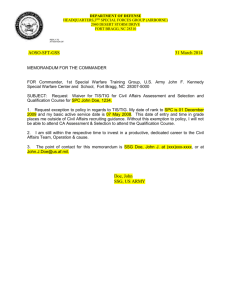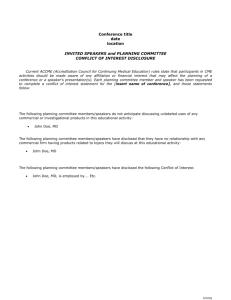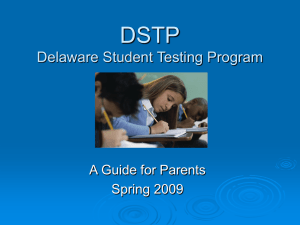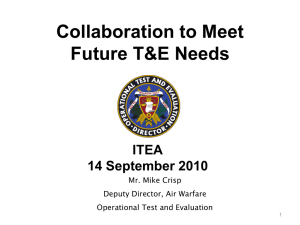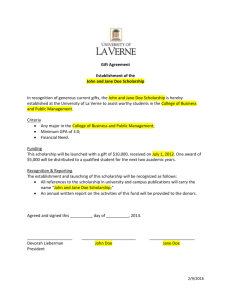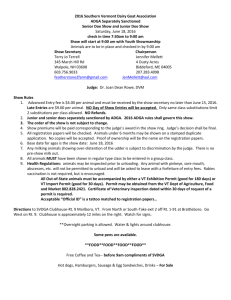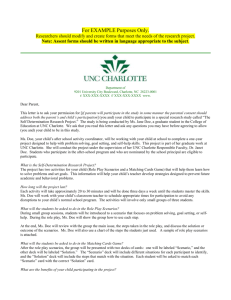Social Media Policy - Department of Education
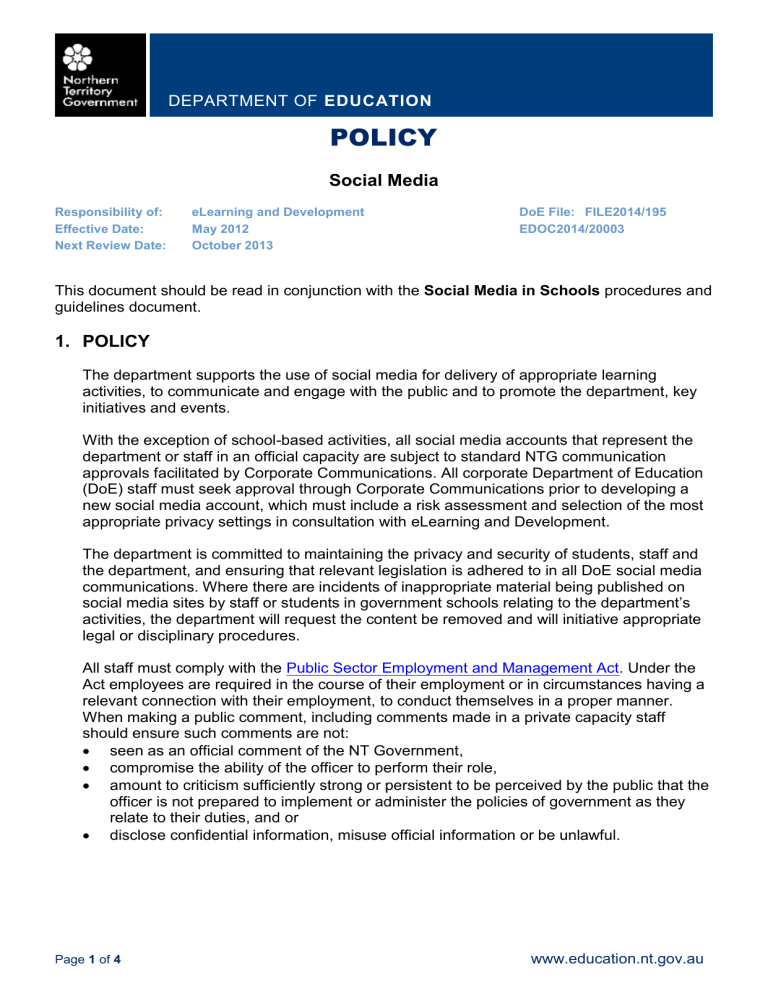
DEPARTMENT OF EMPLOYMENT, EDUCATION AND TRAINING
DEPARTMENT OF EDUCATION
POLICY
Social Media
Responsibility of:
Effective Date: eLearning and Development
May 2012
Next Review Date: October 2013
Target
DoE File: FILE2014/195
EDOC2014/20003
This document should be read in conjunction with the Social Media in Schools procedures and guidelines document.
1. POLICY
The department supports the use of social media for delivery of appropriate learning activities, to communicate and engage with the public and to promote the department, key initiatives and events.
With the exception of school-based activities, all social media accounts that represent the department or staff in an official capacity are subject to standard NTG communication approvals facilitated by Corporate Communications. All corporate Department of Education
(DoE) staff must seek approval through Corporate Communications prior to developing a new social media account, which must include a risk assessment and selection of the most appropriate privacy settings in consultation with eLearning and Development.
The department is committed to maintaining the privacy and security of students, staff and the department, and ensuring that relevant legislation is adhered to in all DoE social media communications. Where there are incidents of inappropriate material being published on social media sites by staff or s tudents in government schools relating to the department’s activities, the department will request the content be removed and will initiative appropriate legal or disciplinary procedures.
All staff must comply with the Public Sector Employment and Management Act . Under the
Act employees are required in the course of their employment or in circumstances having a relevant connection with their employment, to conduct themselves in a proper manner.
When making a public comment, including comments made in a private capacity staff should ensure such comments are not:
seen as an official comment of the NT Government,
compromise the ability of the officer to perform their role,
amount to criticism sufficiently strong or persistent to be perceived by the public that the officer is not prepared to implement or administer the policies of government as they relate to their duties, and or
disclose confidential information, misuse official information or be unlawful.
Page 1 of 4 www.education.nt.gov.au
DoE Policy: Social Media
DoE staff should not interact with students enrolled in any school in the Northern Territory through social media except for educational purposes where approval has been given by the students’ parent or guardian.
In circumstances where staff have pre-existing personal relationships with current students
(outside of school and education settings) any contact through social media still requires the consent of the parent or guardian.
DoE staff should maintain a clear boundary between personal and professional social media use, and should ensure that students do not have access to personal and private information that would be considered inappropriate.
Any official response required from business areas or NT Government schools to content posted on external social media sites (not established by the department or schools) should be treated the same as traditional media queries and referred to Corporate Communications before a public comment can be made. Refer to the DoE Media Liaison Policy for further information.
2. BUSINESS NEED
Social media describes a diverse and rapidly emerging range of communication platforms, which are now in common use throughout the community and provide unprecedented opportunities to share information and engage students in new learning experiences. As a new and highly interactive medium, social media also has associated risks. All social media usage by DoE staff must comply with relevant legislation and department policies to ensure the privacy and security of students, staff and the department is maintained at all times.
3. SCOPE
This policy applies to all Department of Education and Training staff using social media communications made on behalf of the department and all government schools.
4. DEFINITIONS
Social media (also known as social networking or Web 2.0 technologies) is a general term used to describe the tools and forms of publishing which are based on an interactive or online conversation between an author and active readers. These include, but are not limited to, Facebook, YouTube, and mobile phone applications. Content often includes text, audio, video, images, podcasts and live streaming.
Educational social media tools are defined as those networks that function to support and improve learning outcomes through teacher and student online collaboration. These are not personal social networks. There are many educational social networks, including Edutopia,
OpenClass, Classroom 2.0, Edmodo, learncentral, skypeclassroom and IT4ALL. These sites offer a range of services that enable educators to share ideas, share content and build virtual classroom environments that can only be accessed by invited parties.
Content is the expression that occurs within an activity.
Materials are the classifications that identify the activity.
Page 2 of 4 www.education.nt.gov.au
DoE Policy: Social Media
Inappropriate material may include cyber bullying, harassment, defamation, impersonation and publication of inappropriate images or videos.
Public comment: expressing views, verbally or in writing, to the media, in books, notices, or at public events, social media, public forums, conferences or where it is reasonably foreseeable that publication, circulation or comment will flow to the community at large.
Official capacity: undertaking duties on behalf of the department and providing information that represents the views of the department/business area/school.
5. ROLES AND RESPONSIBILITIES (if applicable)
All staff are responsible for:
ensuring all social media interactions (both personal and official) comply with this policy
avoiding foreseeable harm to students under the department’s care and control in all official online communications with current students.
General managers, directors and principals are responsible for:
ensuring that all social media usage is consistent with this policy
ensuring that cyber safety and reputation transgressions comply with DoE Cyber Safety and Reputation Management guidelines and procedures.
Corporate Communications is responsible for:
facilitating approval from the NTG Communications Advisory Committee as necessary for all proposed social media accounts
maintaining a record of official DoE social media sites, including account administrator details
advising and assisting the department and schools in matters relating to the appropriate use of logos, photographs and official department content. eLearning and Developement is responsible for:
advising and assisting the department and schools in matters relating to the use of education social media platforms in learning environments.
6. RELATED POLICY, LEGISLATION AND DOCUMENTS
Public Sector Employment and Management Act
Employment Instruction 12 – Code of Conduct
Information Act 2011
DoE Acceptable Computer and Internet Usage Agreement for Students
DoE Code of Conduct for Schools
DoE Cyber Safety and Reputation Management guidelines and procedure
DoE General Principles for Selecting Suitable Resources in Schools
7. EVALUATION (if applicable)
This policy will be evaluated and reviewed six months after it has been introduced, or earlier, with the introduction of the NTG Social Media Policy. All key business areas will be consulted and department staff and principals will be provided the opportunity to comment.
Page 3 of 4 www.education.nt.gov.au
DoE Policy: Social Media
8. ACKNOWLEDGEMENTS (if applicable)
EDM-PR-003: Use of social media for departmental promotion (Queensland DoE)
Web 2.0 Site Blocking in Schools (Strategic ICT Advisory Service)
Social Media: Guidance for Agencies and Staff (South Australian Government) http://education.qld.gov.au/strategic/eppr/marketing/edmpr003/gdlsanddefs.html
New South Wales DoE Social Media Policy https://www.det.nsw.edu.au/policies/technology/communication/PD20110418.shtml
Victorian Government Department of Justice Social Media Policy http://www.justice.vic.gov.au/socialmedia
Page 4 of 4 www.education.nt.gov.au
